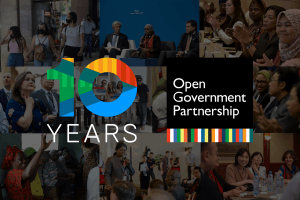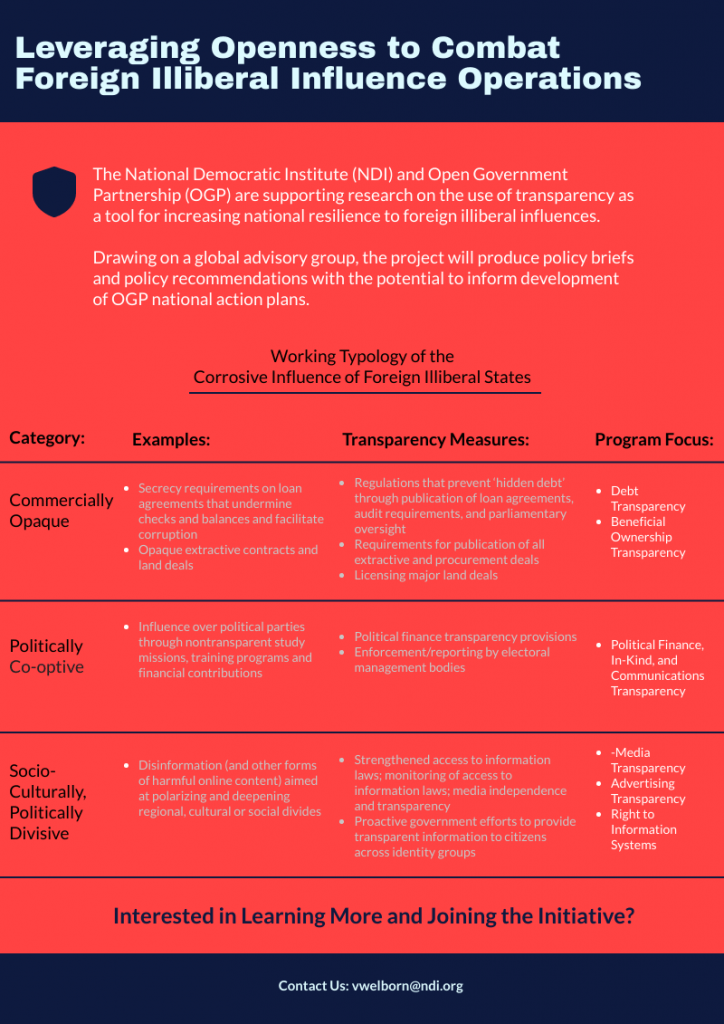Shedding (Sun)Light on Foreign Illiberal Influences
This blog was originally hosted on the National Democratic Institute’s website here.
Efforts by anti-democratic foreign governments to influence another country’s political landscape are on the rise globally. Through illiberal influence operations or covert actions these governments seek to manipulate political sentiment or public discourse in another country. Examples of transnational illiberal actors manipulating the information environment, weakening democratic norms, and undermining inclusive and sustainable economies are well-documented.
Global research conducted by the National Democratic Institute (NDI) has shown that the impact of illiberal influences can be offset by resilient democratic institutions. While levels and types of resilience can vary widely, the role of transparency is particularly critical in enabling greater scrutiny and diminishing space for suspicion and doubt to be exploited by disinformation. Taiwan’s government, for example, has utilized “radical transparency” – through open technology, public policy, and the media – to build a trust relationship. When disinformation enters the information environment, government and media are seen as authorities to dismiss false information that aims to erode the government’s legitimacy. Multi-stakeholder participation — including private sectorGovernments are working to open private sector practices as well — including through beneficial ownership transparency, open contracting, and regulating environmental standards. Technical specificat... More, civil society, legislatures and governments — in the development and enforcement of transparencyAccording to OGP’s Articles of Governance, transparency occurs when “government-held information (including on activities and decisions) is open, comprehensive, timely, freely available to the pub... More policies is also crucial to create and enforce policies that address these threats to democracy.
Recognizing the threat that transnational illiberal operations pose to democracies around the world, NDI and the Open Government PartnershipThe Open Government Partnership (OGP) is a multi-stakeholder initiative focused on improving government transparency, ensuring opportunities for citizen participation in public matters, and strengthen... More (OGP) have partnered to leverage transparency as a means to build democratic resilience. With inputs from an expert advisory group, NDI and OGP are preparing a series of strategic policy briefs identifying transparency and oversight policy measures that are effective in addressing disinformation and curbing opaque commercial and political forms of influence. Drawing on peer exchange roundtable discussions, these policy briefs will help to inform the development of future OGP action planAction plans are at the core of a government’s participation in OGP. They are the product of a co-creation process in which government and civil society jointly develop commitments to open governmen... commitments. The initiative will build on previous OGP and Open ParliamentEnsuring access to legislative information and creating mechanisms for public participation are critical to building an open, trusting relationship with citizens. Technical specifications: Commitments... More successes in countries like Georgia, Colombia, and North Macedonia, to support the co-creation of new and innovative types of commitments that address this emerging threat to democratic development.
2021 marks the tenth anniversary of OGP’s role as an international changemaker for government accountability and transparency. The year will also see a record number of action plans (more than 110 are slated for development). Given the rising trend toward autocratization, many countries’ action plans will feature commitments that include interventions to curb authoritarian overreach and corruption perpetrated by both domestic and transnational actors.
Stay tuned for further developments and email Victoria Welborn ([email protected]) for more information or to get involved.
No comments yet
Related Content

10 Years of OGP
Ten years ago reformers inside and outside government launched OGP – a simple yet distinct way to join forces to create transparent, participatory, inclusive, and accountable solutions

Digital Governance in OGP
OGP countries are leveraging the opportunities of evolving technology, such as artificial intelligence, data-driven algorithms, and mass social networks, while also developing policies to deal with the threats, including disinformation,…

Political Integrity in OGP
Providing for transparency in the funding of campaigns, political parties, and democratic politics is an essential accountability mechanism for democratic government and is a growing focus area in OGP.



Leave a Reply